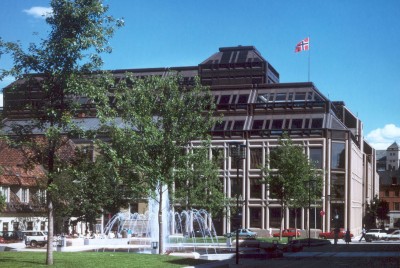The value of the Norwegian krone fell sharply on Thursday, after the country’s central bank left its key interest rate unchanged and indicated it would stay low through next year. The bank’s outlook was viewed as much weaker for the Norwegian economy than analysts and traders had expected.

Norwegian industrial companies cheered the move, which left both the dollar and the euro stronger against the krone. It took NOK 5.90 to buy a dollar by mid-afternoon, up from NOK 5.80, and NOK 7.80 to buy one euro, up from NOK 7.68.
The strong krone of recent years has made Norwegian exports even more expensive than they otherwise are, and made it harder for Norwegian products to compete against foreign products. Now, with some economists interpreting the central bank’s outlook as a sign it won’t only keep rates low but cut them as well, the currency took a sudden fall.
Analysts and investors were surprised by the bank’s statements that economic activity was “lower” and growth “slower,” and that central bank governor Øystein Olsen suggested its key policy rate may be trimmed.
“This is much weaker than we had expected, and the market is looking at the exchange rates,” Erik Bruce, chief economist at Nordea, told website dn.no. “The Norwegian krone has weakened on a broad basis.”
Rune Bjerke, chief executive at Norway’s largest bank, DNB, went so far as to say that Norway’s “golden age was over.” Bjerke told a business audience in Asker Thursday morning, before the krone fell, that there are now “clear signs that it’s going slower also here” in Norway. Europe, Norway’s biggest market for everything from oil and gas to seafood, has been in “deep crisis” and Bjerke pointed out that Norway is now more dependent on growth economies in Asia.
Even though Norway’s central bank is keeping interest rates low, Bjerke insists that new state demands for capital and liquidity make it “unavoidable” that commercial banks’ interest rates will rise. DNB, in a highly unpopular move, raised rates earlier this year and most other banks followed. Now they all may raise rates again, to improve their own bottom lines, and force the central bank into a cut to avoid more economic slowdown.
Views and News from Norway/Nina Berglund
Please support our news service. Readers in Norway can use our donor account. Our international readers can click on our “Donate” button:

